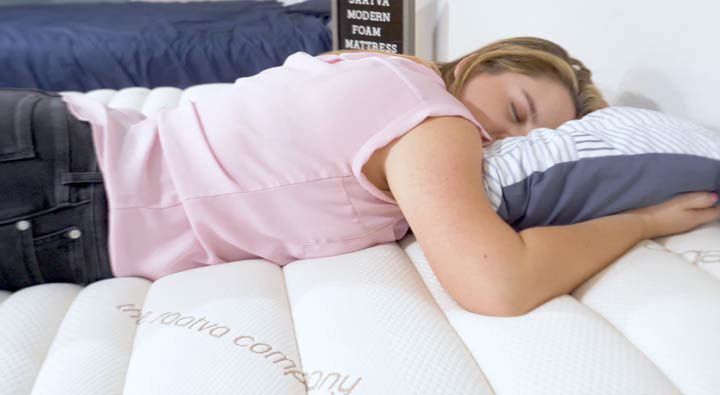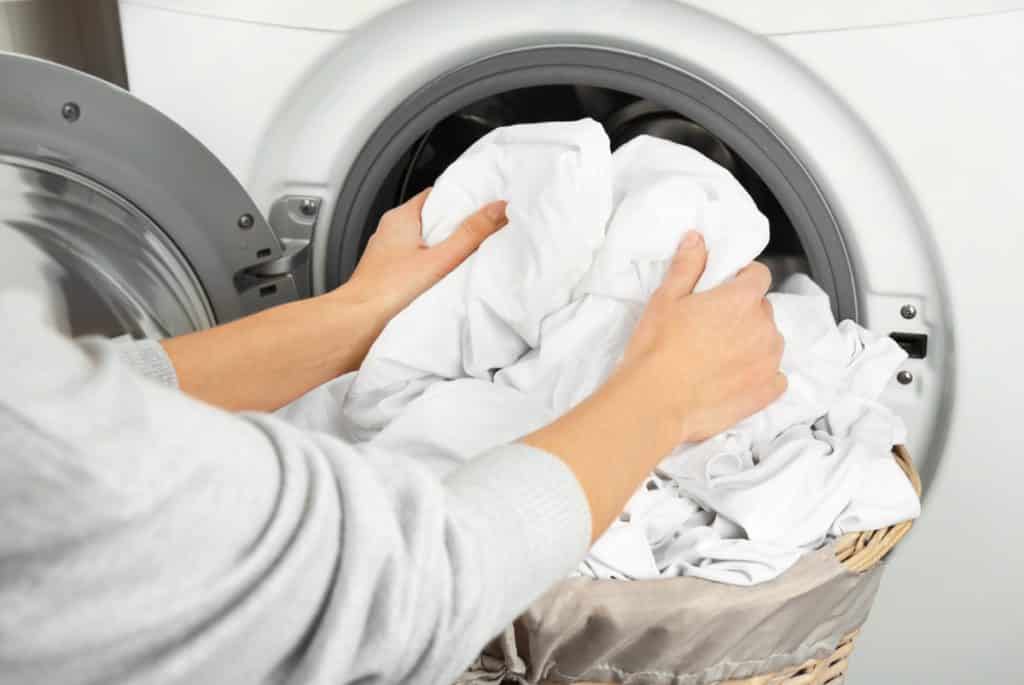You might have heard that it’s important to get your beauty rest every night. But did you know that poor quality sleep may have the opposite effect on your skin? Sleep experts discourage stomach sleeping because the position may promote back and neck pain and may impair spinal alignment. Stomach sleeping is also known to be harmful to your skin, causing acne and wrinkles to appear.
No one wants to deal with painful or unattractive acne. Keep reading to learn how stomach sleeping is related to the health of your skin and how you can prevent acne from forming in your sleep.
Stomach Sleeping and Skin Health
If you are a frequent stomach sleeper, you may be sleeping against a dirty pillowcase that’s impacting your skin health. In short, skin health refers to the overall well-being and appearance of one’s skin, often alluding to one’s face. Maintaining one’s skin health is a holistic practice that requires daily upkeep.

Dust, oil and the products you apply to your face tend to build up on pillowcases that you lie on every night. Residue left on pillowcases could be responsible for clogging pores impacting the skin’s texture and clarity. Furthermore, applying pressure and rubbing your face against your pillow can also clog pores and cause signs of premature aging. Stomach sleepers are most susceptible to these skin health risks due to the increased amount of contact between their faces and pillows.
How Stomach Sleeping Contributes to Acne
Dermatologists describe the process of acne formation as when excess oil, dead skin cells or bacteria plug pores in the skin. There are several environmental factors that can increase the risk of developing acne, including diet and pollution. Read below to learn more about how stomach sleeping can also increase your risk of developing acne.
Weakens Skin Barrier
The function of the skin barrier is to protect the innermost layers of skin from environmental stressors and allergens. The barrier also maintains the skin’s sebum production, oil produced by the sebaceous glands that keeps skin moisturized. Unfortunately, friction and pressure between your face and the pillows you sleep on can weaken the skin barrier. A compromised skin barrier is often associated with dry or irritated skin along with breakouts.
Reduced Collagen Production
Collagen is an abundant protein in the body responsible for the structural integrity of the skin. Collagen is produced while we sleep, and research suggests that sleep deprivation and poor quality sleep reduce collagen production. Low collagen levels are associated with facial wrinkles and sagging skin. While collagen is not known to treat acne, it can reduce the appearance of pores, leading to youthful looking skin.
Lower Melatonin Production
Melatonin is the hormone associated with maintaining the brain’s circadian rhythm. Similar to collagen, melatonin is linked to anti-aging and anti-inflammatory properties. Sleep disruptions and low-quality sleep environments can negatively affect the body’s melatonin production. As a result of lower melatonin production, you may wake up with dull or tired looking skin.
Tips To Avoid Acne From Stomach Sleeping
The good news is that acne from stomach sleeping is both preventable and treatable. Check out these tips for how you can avoid waking up with breakouts.
Alternative Sleeping Positions
As mentioned before, sleep experts discourage stomach sleeping for other reasons besides preventing acne. Stomach sleeping causes the hips to not be properly aligned with the spine, which results in back pain. It is more optimal to either sleep on your back or your side. This is especially true if you suffer from neck or back pain. Luckily, there are steps you can take to modify your sleeping position if you tend to sleep on your stomach.
RELATED: How to Train Yourself to Sleep on Your Back
Maintain a Clean Sleeping Environment
Your sleeping environment comprises several factors including the bed and room you sleep in. Sleeping in a room with airborne dust and allergens is not only detrimental for quality of sleep; it’s detrimental to the skin. Routinely cleaning floors in surfaces that attract dust, hair and dander to improve sleep quality. Another simple solution is to keep an air purifier in your bedroom to eliminate airborne pollutants.
Use Clean Pillowcases and Sheets
Similarly, having clean pillowcases and sheets will help keep your skin clear and healthy. Washing sheets isn’t something most people look forward to, but it’s necessary nonetheless. Just because your pillowcase or sheets look clean doesn’t mean sweat, dead skin cells, bacteria and more aren’t lurking in your bedding. That’s why many experts recommend washing bed sheets and pillowcases once a week. But if you have acne-prone skin, consider changing your pillowcase every day. It’s also important to air out and wash your pillows at least every four to six months.

Opt for Breathable Fabrics
Not all bedding is created equally. And some types of pillowcases are more harmful than others for skin health. Cotton pillowcases may be popular and affordable, but they create more friction between your face and your pillow that results in breakouts and wrinkles. Experts recommend sleeping on silk pillowcases for their hypoallergenic qualities and its benefits for hair and skin health. Satin pillowcases offer similar benefits to silk pillowcases, but are not as durable and breathable as silk.
Apply Proper Skincare
Throughout the day, your face is exposed to pollutants, products and oil from your pores. It’s important to wash your face every night with a gentle cleanser to prevent residue from collecting on your pillowcase. After you cleanse your face, use a moisturizer to hydrate and replenish your skin barrier overnight. Be sure to let any skin products you apply at night absorb into the skin before getting into bed. That way your skin care products do not sit on top of your pillowcase.
Final Thoughts
Stomach sleepers spend the most time with their faces against their pillows. Unfortunately, pillowcases absorb contaminants such as dust, sweat and bacteria that cause clogged pores and breakouts. Resting against a dirty pillowcase can compromise your skin’s health by disrupting natural processes that occur while you sleep.
Cleaning your pillowcases and sheets at least once a week are some of the most effective ways to prevent breakouts. It’s also important to wash your face every night to maintain your skin’s clarity. It’s always possible to modify your sleep behaviors to improve your sleep quality and overall skin health.
FAQs
Is sleeping on your stomach bad for your skin?
Sleeping on your stomach is not ideal for the health of your skin. This is because stomach sleeping increases the amount of contact between your face and the pillow you sleep on. Lying against dirty pillowcases can cause breakouts and facial wrinkles.
How should I sleep to prevent acne?
In order to prevent acne, it’s crucial to sleep in a clean environment. Excess oil, dead skin cells and bacteria have the ability to clog and plug the pores, forming acne. Washing your face every night and maintaining the cleanliness of your sleep environment are sound ways to prevent acne.
Does your sleeping position affect your skin?
Sleeping positions impact your quality of sleep and your skin health. Generally, sleeping on your back is the most beneficial for your overall well-being. This position minimizes the amount of contact and pressure between the face and pillowcase, leading to better skin health. Sleeping on your stomach can negatively impact your skin’s texture, clarity and elasticity.

